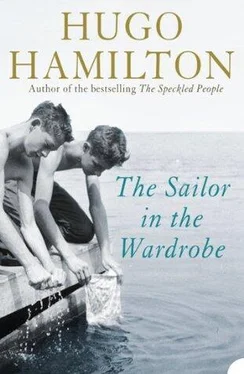1 ...8 9 10 12 13 14 ...53 Now it’s me running away, just like my mother. Now it’s the fireman and all the other bonfire boys coming after me through the streets. The fireman must have got out through the park gate because I saw him following me all the way with the boys ahead of him, running hard and catching up fast. Further back, some of the men were following, too, and I was afraid the whole city was after me. I was afraid the women would try to bar my way and that nobody would tell the fireman to have mercy on me.
At the end of the street I didn’t know which way to turn, so I climbed up onto the roof of a parked car and from there onto a wall that had some glass shards sticking out of the top. I could see nothing below me on the far side. I couldn’t even see how deep it was. It was black down there and no matter how much I stared down, waiting for my eyes to get used to the dark, I was blind and afraid to jump. I held my hands out in front of me as if that would help me find out what was down there on the other side, desperately searching for a safe place to land. I had no idea what I was going to jump into and thought I would be impaled on spikes. I thought of vicious dogs. I thought my chin would hit a tree stump or an upturned wheelbarrow. I thought maybe there was nothing down there at all and that I would just keep falling without ever reaching the ground.
I waited on the top of the wall until they caught up with me and I could see them below on the pavement. Some of them were already getting up on the car. The fireman was reaching his arm up along the wall to try and drag me back down again. So I jumped into the unknown. I threw myself into the darkness and kept falling down, down, for ever into the dark until I disappeared.
After that I was afraid the fireman would turn up at the door of our house. If he couldn’t punish me himself, then he would try and get my father to punish me instead. I couldn’t sleep because I thought they would come and arrest me as a juvenile offender. I tried to work out what I would say, how I would lie to them and say it was dark and the fireman got it all wrong. It wasn’t me. They would call me a delinquent and ask me why I ran away if I was so innocent. The fireman would bring witnesses who would point at me and say: that’s him, Eichmann. But I would stare them all out and say it was a mistaken identity. Only my mother would be on my side and believe me.
Nobody came to the house. But that didn’t mean it was all forgotten. I knew they were still after me, so I had to go on the run, like Eichmann in Argentina. From then on, I had to avoid being seen on the streets. I had to become invisible and find ways of getting around without anyone noticing me. I drew up a map of detours through laneways and gardens. Instead of walking straight down to the seafront along the street, I started going around by the edge of the football field, across the disused farm, through the timber yard. I invented all kinds of complex escape routes around the neighbourhood, through building sites and derelict land. I got to know every foothold in the wall and every gap in the barbed wire.
I decided that I had to go underground. I had to pretend I didn’t exist any more. Nobody saw me going to school on the train in the morning. Nobody saw me coming home. Of course there was always a chance they might be waiting for me on one of my secret routes, that I would be trapped and put on trial again. Franz always thought it was safer to be out in the open where there were more adults around. But I trained myself to stay out of sight. Occasionally, somebody would spot me crawling for a few feet along the top of a wall. I would hear a shout or an angry knock on the window behind me, but I was always long gone before anyone took much notice. I would see people in their houses, in the kitchen with the lights on, sitting at the table with their backs to the window having their tea, people watching TV with blue faces, and me passing by outside like a gust of wind. I was living underwater now, running along the sea floor and breathing in silence.
Even at home, I became invisible. My mother said we’d always been doing strange and unusual things like putting stones in our ears when we were small, but this was one of the oddest things she had ever heard of and she hoped I wasn’t starting to lose my mind. She said I was going around the place like a ghost and one evening, when she called me to dinner, I didn’t go down the stairs but out through the window instead. I stepped past the beehives, climbed down onto the garden wall and came in through the back door. Then I sat down at the table without a word, as if I was totally out of sight. She even played along with it for a while, asking if anyone had seen me. But then she begged me to come back to life again because she was worried that I might disappear into myself. She waved her hand in front of my eyes and made faces at me until I had to laugh.
‘You can’t go underground in your own home,’ she said.
At the dinner table, I started speaking to myself in English. Every evening I looked at my father in front of me and I was having a big conversation inside my own head in the forbidden language. He must have known that I was breaking his rules, but there was nothing he could do to stop me speaking to myself in secret as if I had disappeared to a different country.
My mother said she understood why you sometimes have to become invisible. She remembers the time under the Nazis when Onkel Gerd, the Lord Mayor, had to disappear because he was silenced and they threw him out of office for not agreeing to join the party. First it was people like Onkel Gerd who were invisible, she says, but then it was the Jews who could not be seen anywhere on the streets in Germany. My father says the Irish also went underground against the British. He says they lost their language and now they’re all walking around like ghosts, following maps with invisible streets and invisible place names. He says the Irish are still in hiding in a foreign language. But one of these days they’ll come out and speak their own language again.
At night I stayed awake, thinking of more and more ways of getting around without being seen by anyone, imagining tunnels where I could actually move from place to place under the streets and come up through manholes. I imagined that I could vanish and live without ever touching the streets, without breathing. I imagined that if they ever caught me, I would vanish into thin air right in front of their eyes. I imagined clever things to say in English that would distract them and give me a chance to escape again. I thought about how I jumped off the wall into the darkness. I lay in bed and kept falling for ever. I thought my mother was falling as well. All my aunts and uncles in Germany falling down without ever reaching the ground, everybody in Germany just going down, down, down, without stopping. Until I started getting headaches all the time and I was no longer able to get up and go to school. All the invisible maps of the world were no good to me and the headaches got so bad that I just wished I could give myself up and get it over with.
When Eichmann was discovered living underground in Argentina, they were able to identify him by the injuries to his head which he suffered once in a motorbike accident, before he joined the SS. After being in hiding for so long, he was lonely and felt that anything was better than being invisible. When they walked up to him at a bus stop and identified him as Adolf Eichmann, the man who organized the transport of Jewish people to the concentration camps, he was probably shocked at first because it sounded like the worst insult in the world, the curse of his own name coming after him all these years later. He must have thought of denying it, but there was no point. Perhaps he was relieved to be himself again. He didn’t want to be imprisoned or executed, but he didn’t want the pain of being invisible either. People say that he was given a choice right there and then at the bus stop, whether he would prefer to be executed on the spot or travel to Jerusalem to be put on trial. So he agreed to go on trial because he wanted recognition. He was fed up being a nobody in Argentina. He didn’t own up to his guilt or ever say that he was remorseful. He didn’t admit to his crimes and said he was only doing his duty, trying to be as efficient as possible. He wanted to be famous for doing a great job, better than anyone else in the world had ever done before that. He wanted to stay alive for ever in history.
Читать дальше
Конец ознакомительного отрывка
Купить книгу












